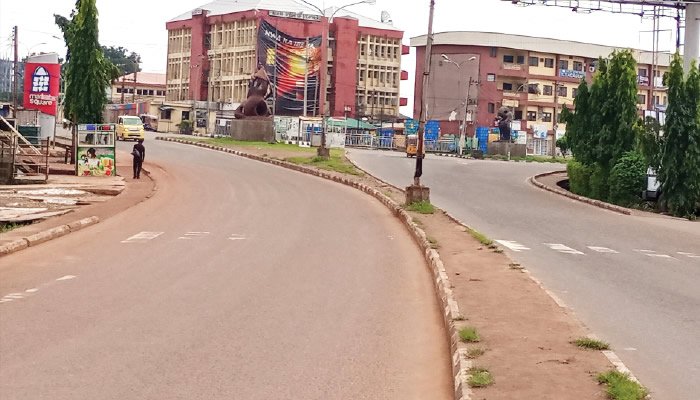
THE eerie silence on the streets and markets of the major cities in the five South-Eastern states on Mondays and the push-back from some critical stakeholders call attention to the urgent need to stop the illegal sit-at-home curfews imposed by non-state actors on the South-East region. Reports that businesses, public offices, financial institutions and markets in parts of the region were again shut down yesterday as residents remained indoors came amid fresh attacks and killings by the bloodthirsty assailants laying siege to the region. They must be stopped and quickly too.
The proscribed Indigenous People of Biafra had in 2021 declared every Monday in the South-East as sit-at-home to protest the continued detention of its leader, Nnamdi Kanu, who is facing charges of treason, terrorism and illegal possession of firearms in Abuja. The curfew is also called on days Kanu is to appear in court.
Moreover, some yet-to-be-identified killers have been compelling obedience to the civil action by brutal violence. The exercise of the right to protest through lawful means is a cherished freedom that everywhere strengthens popular input into democracy. However, as this newspaper has consistently argued, the choice to participate or not is also an inalienable right of every citizen. The violent gunmen coercing residents across the entire South-East region to join their campaign or be killed or maimed is terrorism.
The aggression has gone on for too long. All efforts must therefore be made by all stakeholders to put an end to the frequent closure of social and economic activities of an entire region by murderous outlaws.
Though IPOB and its armed wing, the Eastern Security Network, claim they had reversed the order, armed murderers acting in their name have been violently enforcing it. From captivity, Kanu has also disowned the enforcers. These have not stopped the siege. Consequently, businesses, traders, residents, and travellers in the region have been hard hit. A fortnight ago, the gunmen enforcing the illegal directive killed a truck driver and his assistant in Delta State, in the South-South region. A female resident was killed in Enugu State. Markets, schools, banks, hotels, offices and worship centres are usually locked on days of the illegal sit-at-home order. A state legislator was kidnapped in Anambra State and decapitated. Local government offices, police stations and military checkpoints are attacked and people killed.
Subjected to mindless violence and killings despite heavy military presence, residents in the region stay indoors on Mondays, unwilling to risk the wrath of the killers. Repeated encouragement and assurances of their safety by some state governors have not assuaged the fear of the “unknown gunmen.” In the past, some who disobeyed the order were murdered.
The Federal Government and its security agencies are convinced that the culprits are IPOB and ESN, despite their denials. The security agencies need to determine the culprits with evidence and act accordingly. They should locate and apprehend the bloodthirsty criminals.
The costs of the curfews to the region and Nigeria are prohibitive. Trading activities in the major markets in Onitsha, Nnewi, Ariara Market in Aba, Ogbete in Enugu and Relief Market in Imo suffer. These markets draw patrons from all over West Africa and beyond. The governor of Anambra, Chukwuma Soludo, estimates losses to the state from every sit-at-home lockdown at about N20 billion. The other four governors in the region and all other stakeholders should join in his avowed resolve to end it.
Non-state actors and terrorists are dictating the economic and social pace of the region, constituting a parallel authority to the formal ones. The arrogance of the shadowy gunmen should be resisted. They are terrorists. They cannot hide under the legitimate banner of self-determination. In recent times, self-determination agitators in the South-West have held public rallies at home and abroad; there was no attempt to violently compel anyone to join, and they did not launch a murderous reign of terror on residents. Agitators in the South-East should be civilised and shun barbarism.
To combat the menace, the governors and the security agencies need to work extra hard to keep the residents safe. They must protect the helpless residents who would rather stay indoors than risk their lives as past reassurances of their safety from the governors have been meaningless. Without effective deterrence, those defying the terrorists have been attacked, their vehicles, shops or businesses destroyed or torched. Some were killed.
The governors need to devise extraordinary region-wide responses combined with state-specific initiatives to stamp out the reign of terror and prevent the area from descending into total anarchy.
The federal troops and police need to change their tactics and win over the support of the traumatised people. Militarising the region alone without gaining the support of the people will not work. As the police have said, the gunmen are indigenes embedded among and known to the people.
A workable strategy is to win the people’s support, track those who fund, support and provide material comfort to the insurgents. It is necessary to identify and disrupt their sources of funds, arms and supplies. Residents must be persuaded to collaborate with security agents by offering useful information to enthrone peace.
Counter-insurgency operations have to be intelligence-driven, through covert operations with support for the apparently overwhelmed police formations there. Modern policing relies on intelligence-gathering and deployment of technology tools. The governors of Anambra, Enugu, Abia, Imo and Ebonyi should mobilise strong political will and map out joint strategies. This is the time to urgently activate, reform, and generously fund the region’s security outfit, Ebube Agu. The sit-at-home tyranny must be crushed.
Copyright PUNCH.
All rights reserved. This material, and other digital content on this website, may not be reproduced, published, broadcast, rewritten or redistributed in whole or in part without prior express written permission from PUNCH.
Contact: [email protected]





